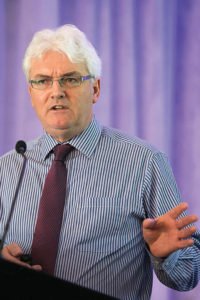A recent conference in the RCSI looked at affordability, innovation and access to medicines, both in Ireland and internationally. David Lynch reports
Last month, the RCSI hosted the ‘Affordability and Innovation, Access to Medicines Ireland 3rd Annual Conference’, where issues around the cost and access to new medication were debated by a range of speakers.
Speaking at the opening of the event Prof Hannah McGee, Dean of the Faculty of Medicine and Health Sciences at RCSI, said that the conference was aimed at addressing “the problem of spiralling drugs cost, which threatens to bankrupt all our healthcare systems, and to deny many patients access to essential medicine”. Prof McGee added that this was a problem “right across the world, including potentially Ireland”.
Prescriber
Speaking at the conference, Deputy Michael Harty, Chair of the Joint Oireachtas Health Committee, had some critical words for the current prescribing regime.
“I’m a prescriber and I must say I’m horrified at the amount of medication that is being prescribed at the moment,” said Deputy Harty, who is also a GP based in Co Clare.
“In particular, nutritional products. We as prescribers are put under substantial pressure by the media, but also by our own fellow professionals, to prescribe nutritional products for a leg ulcer or for some [other] issue that I really just wonder if there is any value in prescribing them.”

Deputy Harty also added that he believed there was a particular challenge with nursing homes.
“You would need a truck of the proportions of an oil lorry to deliver nutritional products to some of our nursing homes,” he added.
Deputy Harty also questioned some of the advice given by dieticians employed by nursing homes with regard to nutritional products.
He felt the Government had an important function in the area of access to medicine. “It is the Government’s responsibility to make medicines available, but not at any cost. It is the responsibility of the pharmaceutical industry to be transparent and fair in setting prices, relative to the cost of research, development and the production of medicines,” Deputy Harty told delegates at the conference.
“So there are a number of issues that need to be clarified. There is a lack of financial transparency, to justify the high prices that industry places on drugs, with industry citing commercial sensitivity as a means of avoiding transparency. If one takes cancer medication as an example, evidence suggests that prices of cancer medicines bear little or no relationship with the research and development costs,” he said.
“Secondly, financial returns on cancer medicines are very high to the pharmaceutical industry. The potential impact on profitability due to lower prices could be offset by a higher volume of these medications being made available. Especially, when the marginal costs of production is low.
“Finally, Government’s non-profit making [public] sector make a substantial contribution to research and developments through direct funding and other incentives, therefore we should attach conditions to [and] require increased transparency on any drugs developed as a result. Specifically, we should be entitled to ask how public funds are being spent and that there be some price control on any subsequent drugs.”
Deputy Harty praised some actions by Government, such as working closer with Benelux countries in terms of negotiating prices with the pharmaceutical industry.
Deputy Harty also said that the Government should support other initiatives that are being taken on the international stage.
“The UN has a higher-level panel on access to medicines that recommends a global pool research fund to which we would [Ireland] contribute and then have control [of] overpriced medicines.
“This is something we need to do, to secure medicines that we need at the right price,” according to Deputy Harty.
Compulsory
During his remarks to the conference Deputy Harty said the Government “should also look at” compulsory licensing for certain drugs. This is where a country can, without the permission of the patent holder, produce the medicines domestically for sale at generic prices, “while paying a reasonable royalty to the patent holder to compensate”, according to the Deputy.
The issue of a compulsory licence for certain drugs featured heavily in the early session of the conference.
Mr Bas Leerink said that in the Netherlands, the issue had been looked at, but that some areas of the Government had been reluctant. Mr Leerink was the Chairperson of the committee, which prepared the report of the Dutch Health Council, Development of New Medicines: Better, Faster, Cheaper.
Mr Leerink said that it was argued by some that “if you are infringing on patent rights, it is something that not only affects [the] pharmaceutical industry; it has side-effects to other parts of the economy which might be effects you don’t want.
“I don’t know if that is true,” said Mr Leerink, but he added “there will also be a legal fight. You can do it, but you will have a legal fight, and not a small one.”
“There needs to be more people active, voicing their concerns, looking for things to change, and that needs to be supported. And it needs political courage from political leaders and those in the health community to take steps that might be risky.”
Asked whether he opposed the introduction of compulsory licenses Prof Michael Barry, Clinical Director of the National Centre for Pharmacoeconomics (NCPE), said that his opinion on it “varies”.
“I think one thing there would be concern about would be the innovation side,” he told the conference.

“If you don’t have patent protection, why would you be bothered to go out and create new products and so on? I think that for me would be the unintended consequences.”
On the general work of the NCPE, Prof Barry said “there is a lot being done”.
“I look at the work our team does every day. They do so much in terms of the evaluation of medicines, but also we have looked very carefully at patient involvement,” he said.
“Also, the HSE established the rare diseases technology review committee, which invites patients to come in — I found it really interesting.”
Asked whether there are enough resources and political support for the NCPE, Prof Barry said that over the past “21 years we have got great support across the political scene; people from all parties have supported us”.
“And the current Minister [for Health] has supported the centre greatly by providing the staffing we needed to help us cope with the tsunami of medications that are coming towards us. I think we need more [staff], but we won’t say that yet.”
Paid
Prof Barry addressed some concerns raised by attendees at the conference that the Minister for Health has the right to override a decision made by the NCPE regarding a drug.
“We have got to be clear,” he said. “In the NCPE we give advice, we don’t make the rules and it’s up to others to take that advice or not.
“We are not the decision maker and we should never feel we are the decision maker so that’s what we do. We can say whether a drug is cost effective or not. But it’s up to others to decide.”
The conference also discussed the possibility that some patient groups receive funding from the pharmaceutical industry and whether this represented a conflict of interest.
“We have the same with clinicians,” said Prof Barry.
”We have ‘key opinion leaders’, or as I like to say, ‘paid key opinion leaders’. I think it’s important that anyone who stands up in front of you and talks about medicines, they should declare their conflicts of interest. And if anyone is paid by the industry, I stop listening — it is as simple as that. You are paid, you are biased. Get over it.”
During his address, Prof Barry was highly critical of the pricing strategies of the pharmaceutical industry.
“I don’t know if they make any sense to you, but they make absolutely no sense to me,” he said. “They are unrealistic, they are unsustainable and its about time that someone woke up and smelled the coffee.”
There were no representatives from the pharmaceutical industry at the event, although organisers announced at the conference, and confirmed to the Medical Independent (MI) afterwards that the Irish Pharmaceutical Healthcare Association (IPHA) were invited to send representatives to the conference. However, they declined the invitation.
An IPHA spokesperson told MI that “we chose not to attend the event as we thought the panel was overwhelmingly weighted towards some with entrenched perspectives on the issue of price”.
“IPHA would be happy to take part in future panels that are more evenly balanced to cover all perspectives fairly.”
International
The conference was also addressed by Mr Diarmaid McDonald from Just Treatment UK. He argued that patient activism was important and all governments should stand up to the pharmaceutical industry’s pricing system.
“The Italian government is proposing to the WHO a suite of transparency interventions that could be really important for us to better understand what is going right and what is going wrong,” he said. “And the Irish Government should be pressured by all of you to support that request.”
He said it was important to explore “how patients can demand that Government use its power to threaten the patent monopolies of drug companies whenever they charge unjustified high price, and not constantly looking for the Government only to spend more money. That is one tangible shift in focus that patient groups could take… ”
Mr McDonald said there was also international experience that could benefit the campaign for more affordability and greater access to medicines.
“There are hospital groups in the US that are now collaborating around establishing non-profit generic manufacturing capacity to tackle the unfairness that exists in the market in the US,” Mr McDonald said. “There are a lot of really great examples around the world in Brazil, Cuba, in Asia of public, private and not-for-profit partnership owned groups — there is no reason why it couldn’t function effectively in Europe and in Ireland or the UK.”
Ms Kay Curtin, a patient expert and advocate, said that “patients should be engaged and be active and do something tangible”. She said that such advocacy is important. “It can be frustrating, but it can make a difference”.
On the issue of access to medicine, an IPHA spokesperson told MI that patients are losing out in Ireland “largely down to ongoing delays in assessing whether or not they will be funded by the HSE”.
“Despite the fact, that prices of new medicines in Ireland are set against the average of 14 other European countries, Ireland is near the bottom when it comes to making these innovative medicines available to patients.”
The spokesperson added “prices are not high in Ireland compared to other countries and in fact, pharmaceutical spend as a percentage of the overall budget is significantly lower”.












Leave a Reply
You must be logged in to post a comment.